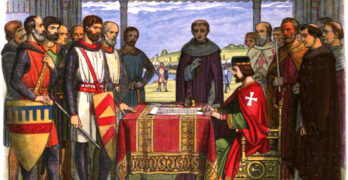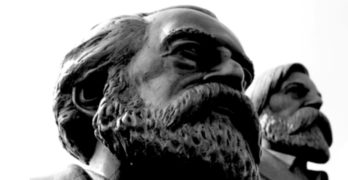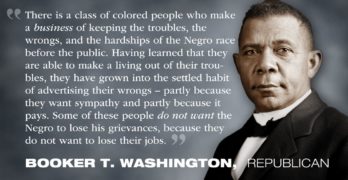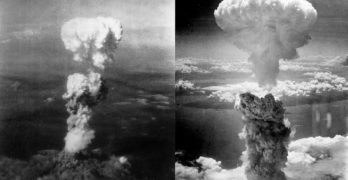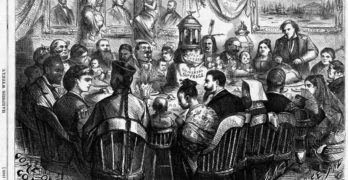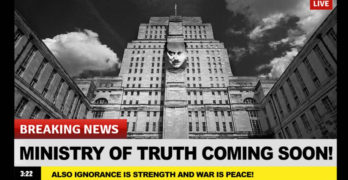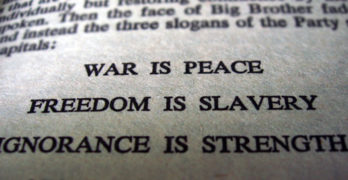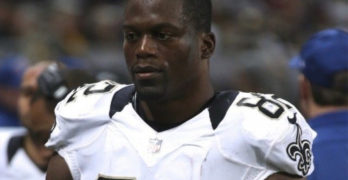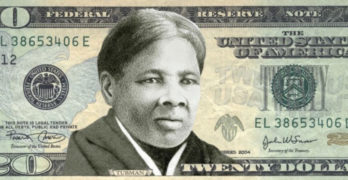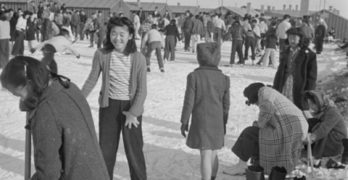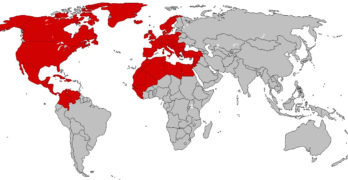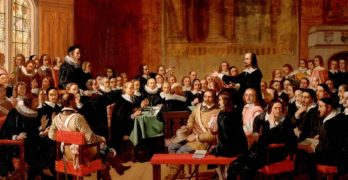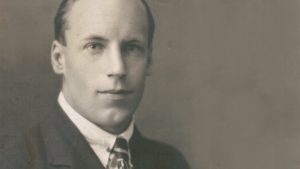
Justice is giving people what they deserve, but mercy is giving them what they don’t deserve. A man was having his portrait painted and said to the artist, ‘I hope this will do me justice.’ The artist said, ‘It is not justice you need, it is mercy!’ All of us are recipients of God’s mercy. If God did not extend His mercy and grace to us, withholding His judgment, many of us would have perished a long time ago.
Paul said it was the riches of God’s goodness, forbearance, and longsuffering that leads us to repentance (see Romans 2: 4). And the apostle Peter reminds us,
The Lord is not slack concerning His promise, as some count slackness, but is longsuffering toward us, not willing that any should perish but that all should come to repentance” (2 Peter 3: 9).
The Psalmist David knew what it was to blatantly dishonour God, yet it was he that wrote,
Blessed (happy, fortunate, to be envied) is he who has forgiveness of his iniquity or transgression continually exercised upon him, whose sin is covered (Psalm 32:1).
That blessed man or woman is anyone who will accept the sacrifice of Jesus and allow Him to be their lawyer before the throne of God. We will all stand there one day. When we do, the Accuser of the brethren will have his say. His evidence is overwhelming. When he screams into our face, “Guilty or innocent?” we will all be guilty.
But before we have a chance to reply, our Lawyer will raise a holy objection. He will step forward and say, “Oh Judge of the Universe, there is a special provision in Your law, and I believe My client can enter a third plea.”
“You have been accused,” the voice thunders from the throne.”Guilty or innocent? How do you plead?”
“Oh Lord, Maker of heaven and earth, I humbly plead the blood of Jesus.” And the party in heaven will begin.
God’s Forgiveness makes it possible to delight in the loving mercy of God so that we are not trapped in the past. John Bunyan beautifully captured God’s merciful forgiveness as he described in Pilgrim’s Progress the burden of sin and guilt that Christian had carried falling off his back and rolling down a hill until it was out of sight. God had forgiven all! That truth from head to heart is the first potion of love.
Reign of Terror, Reign of Love
Now let us contrast this love with another long story of God’s love and forgiveness. This again is from the title of Ugandan pastor, Kefa Sempangi’s autobiography, Reign of Terror, Reign of Love, which yields a remarkable and instructive example of God’s mercy, love and grace.
Sempagi obtained a PhD in art history in the UK and returned to lecture in Uganda at independence, excited at the prospects of his new state. But the dream soon turned sour because of Amin’s reign of terror.
Against this background, Sempangi became the pastor of a large church and was faced with the question of how to respond to this oppression. Although they debated it, church members rejected the use of violence to defend themselves. Instead, the church preached the gospel and served the poor, becoming a shining light in the darkness around it.
We Are Going to Kill You
Sempangi was able to piece together what happened in those fateful days:
Following a service on Easter Sunday 1973, Sempangi was exhausted from hours of praying and preaching. He was also emotionally drained by the memory of a terrible cold-blooded murder in broad daylight that he had witnessed earlier in the week.
Going into his church office alone, he was confronted by five of Amin’s Nubian assassins, who had been sent to kill him. ‘We are going to kill you. If you have anything to say, say it before you die,’ announced the leader of the gang, his mouth twisted with hatred.
What would we do in his place? Sempangi wrote that “for a long moment no one said anything. I could only stare at him.” Sempangi felt so sickened inside and his mouth felt heavy and his limbs began to shake at the thought of death and never seeing his family again. Everything left his control and he thought he was going to drop dead with fear that they would not need to kill him. But listen to what happened next, as recorded in his own words:
From far away I heard a voice, and I was astonished to realize that it was my own. ‘I do not need to plead my own cause,’ I heard myself saying. ‘I am a dead man already. My life is dead and hidden in Christ. It is your lives that are in danger; you are dead in your sins. I will pray to God that after you have killed me, he spared from eternal destruction.
The leader was amazed. He lowered his gun, told the others to do the same, and asked Sempangi to pray for them. He was so dumbfounded and stunned at this, that the assassin had to repeat the request. Sempangi told them to close their eyes – but he kept his open, as he thought that it might be a strange trick. Any minute, he thought his life would end. He did not want to die with his eyes closed. He then prayed:
Father in Heaven, You who have forgiven men in the past, forgive these men also. Do not let them perish in their sins but bring them to yourself.
He testified that their faces changed – they were not the same men who left the vestry as those who entered it. As he left, the leader observed, ‘I saw widows and orphans in your congregation. I saw them singing and giving praise. Why are they happy when death is so near?’ he asked. Sempangi replied, ‘Because they are loved by God, who has given them life.
The days that followed my Easter brush with death were days for sober thinking. I had felt over the sudden change in their intentions was replaced almost overnight by a deep suspicion. Perhaps the men would now fake conversions to infiltrate the church. After all this was common practice in Communist countries and it was well known that Amin was receiving strategy lessons from the Russians.
The Temptation To Quit Ministry
With all these thoughts heavy on our minds, my wife Penina and I spent long hours together discussing the possibility of my resigning from active participation in the church ministry…Conditions in Uganda seemed to be worsening daily.
Amin was now publicly chanting praises to Adolf Hitler, claiming that Hitler had not gone far enough in burning only 6 million Jews. It became even dangerous for ordinary citizens to drive their cars at night. Most frightening of all, an increasing number of Ugandans were turning against their fellow villagers and townsmen.
Personal grudges which in times past had been forgotten or settled privately were now often occasions for bloodshed. It was easy to bribe army officers to arrest or kill one’s enemies, and there was never any danger for the offended party. Even in the church there was no safety.
I had learned in the past month that one of our most active members, a man on the committee of elders, was informing on our congregation for the government. He was a quite shrewd man, tall and well-built, and extremely skilled in working with his hands. Wherever there was a church project requiring manual skills, he was always the first to volunteer. I had never known him well but when I heard of his spying activities in our congregation I was deeply hurt.
In these conditions, where survival was difficult for everyone, it seemed foolish for me to add to my own danger and the danger to my family by remaining as the head of the Redeemed church. I had no formal or financial connection with the church and many of the elders were equally well-qualified for preaching responsibilities….
“I Hear Their Screams and I Cannot be Forgiven”
Penina and I had all but decided that I should leave the ministry when the tall Nubian I had encountered on Easter morning paid his second visit to the church vestry.
I had just finished counselling a young woman whose husband had been murdered by mercenaries when the man walked through the door. I recognised him immediately, and the same fear I had felt while looking down the barrel of his gun gripped me again. I thought I was going to be killed.
The Nubian nodded a greeting and spoke with the same abruptness as before. ‘Now that I am a balokole, a born again one,’ he asked, ‘what do I do next?’ You need to find a Bible,’ I said ‘I cannot tell you what to do, only Jesus Christ can. You need to read his message and see for yourself.’ I told him, as I told all the new converts, to begin by reading the Gospel account according to John.
The Nubian nodded his assent, and left. Four days later, he was back again. As soon as he walked through the door I could see that he was deeply disturbed. His muscles twitched and he clenched and unclenched his hands as if he could barely keep himself from springing on someone.
‘Read this,’ he said, without any greeting at all. He shoved a Swahili Bible into my hands and pointed to John 8:44. I read aloud:
You are of your father the devil, and the desires of your father you want to do. He was a murderer from the beginning, and does not stand in the truth, because there is no truth in him. When he speaks a lie, he speaks from his own resources, for he is a liar and the father of it.
The Nubian looked at me expectantly but I waited for him to speak. ‘Don’t you see,’ he said, his voice trembling. ‘Jesus is talking about me. I have killed over 200 people. I murdered them with my own hands. Nothing stopped me. I never showed mercy. And all the time I thought I was working for Amin but I have been working for Satan. It is he who is my father!’
I remained silent and the man sat down on a nearby chair, weeping. After several moments he became quite and then in a broken voice he told me his story.
All my life,’ he said, ‘I have been dominated by hatred. My stepfather never cared for me, I was always beaten. He beat my mother too and when I saw her lying crushed on the floor I was sick to my stomach. But she never loved me. She hated me and treated me as a burden.
By the time I was a man, I had so much hatred. I never knew love. I started killing people and at first it was hard. But once you kill one person you can go on forever. There is so much guilt; you cannot admit that you hate yourself, and that you have done this terrible thing.
The Nubian spoke so intensely that sweat began dripping his face. ‘I am looking at a man who has come to his end,’ I thought to myself. ‘He has no more mental or emotional strength.’
The Nubian continued with his story.
When we came to kill you on Easter morning,’ he said, ‘we were going to kill you in front of everyone. We were going to show you our power. But we kept sitting in the service. I didn’t hear anything you said. I could only see the widows and orphans who were sitting around me. Some of them I knew. I had killed their men with my own hands, and I expected them to be weeping and mourning. But they were clapping; they were singing songs and were very happy. Their joy made me so afraid. I thought to myself. If for one moment I could understand it, I would give up everything.
‘When we came to this room and you prayed for us, I did understand. I felt something in my life I had never felt before. But now I have read of this man Jesus. And I cannot believe. I cannot be forgiven. My father is Satan. Every night I go to bed and see the faces of the people I have killed. I hear their screams and the screams of their women and children. I never heard them before, but now I hear nothing else. They never leave my heart and I cannot be forgiven.
As I listened to him pour his torment, my fear for own life completely disappeared. I wanted to comfort him, to convince him of God’s forgiveness but could find no words to speak. For a moment I myself even doubted that God would want to forgive such a man. How much human misery he had brought to our lives! How many people had he destroyed? With a great effort I pushed these thoughts aside and picked up my Bible…
I read with the Nubian testimony after testimony of God’s love and forgiveness. When we had finished, the words of Isaiah had become a new and living reality for both of us:
I have swept away your transgressions like a cloud, and your sins like mist; return to me, for I have redeemed you.
The Nubian prayed that God would continue to reveal to him the truth of His word and together we asked God to empower us by his Holy Spirit that we might believe in the forgiveness of sins.
“I Have Found the Love of Jesus Christ”
On the following Sunday I saw the Nubian again. He and other four men who had invaded the church vestry were now attending our church services and afterwards he came alone to meet me in the vestry. His face was covered with a broad smile and he moved as if he were about to dance.
I have found the love of Jesus Christ,” he said. “I am a new man. I can feel it; my sins have been taken away. A few days ago I was ordered on a raiding mission by my commander. When we came to the house we were supposed to plunder, I pointed my gun in the face of the owner and he was trembling. Then I told him, “You are a dead man. But I have met Jesus Christ and my sins have been forgiven. I am a free man and I will free you. Then I let him go.
I was so happy to see the transformation in the Nubian’s life that I hardly noticed his strange method of evangelism. Later, when it came to mind, I did not know whether to laugh or to sigh. Testifying from behind a loaded gun!
The Blood of Jesus Christ Covers a Multitude of Sins
From this man I learned that the blood of Jesus Christ covers a multitude of sins. The Nubian was a man whose life had been shaped by the absence of God’s love. From the beginning he had been a rejected personality, a man who hated his own image. He had tried to recapture his human dignity by destroying other human beings, but he had only fallen deeper into self-hatred and insecurity.
It was vicious circle: the more he hated himself the more cruelly he acted, and the more cruelly he acted the more he hated himself. But now, by the love of Jesus Christ, he had been released from this bondage. He had found a new and secure identity as a child of God.
Idi Amin rejected God’s Love
I thought of Idi Amin. His father had left him at birth and his mother had toured army barracks as a camp prostitute. His tribe, the Sudanese Nubians, had become notorious for their sadistic brutality and vengeful spirits. Perhaps Amin too was a man who had never known God’s love. Perhaps he too found his self-worth only in hating.
If so, his insecurity could only become paranoia. Hundreds of thousands of people had died at his hand and at the hands of his Nubian mercenaries. In a society of extended families, where death means two hundred enemies, such crimes were unforgivable.
Amin’s enemies were innumerable, and the more he tried to eliminate them, the more new enemies he made. He too was caught in a vicious circle. He would never be able to stop killing. He would never be able to make himself secure.
Unless the love of God had clasped close to the heart of Amin, he would never be confident of who God created him to be.
Final Thoughts
He who is forgiven much loves much. Was it not this same daring courage on the part of the prostitute who walked into the Pharisee’s home Simon and lavished her ointment and tears upon our Lord, just to express her forgiveness? Jesus said,
Therefore I tell you, her sins, many as they are, are forgiven her-because she has loved much. But he who forgiven little loves little (Luke 7:47).
Love’s first step is to believe and receive fully God’s mercy. I once read somewhere that “only God is able to humble us without humiliating us and to exalt us without flattering us.” That is what His love, grace and forgiveness accomplishes.









